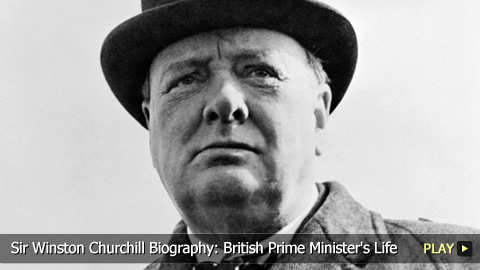Sir Winston Churchill Biography: British Prime Minister's Life

Early Life
Winston Leonard Spencer-Churchill was born November 30th, 1874 in Woodstock, Oxfordshire,
England. Churchill overcame poor grades and a severe speech impediment to graduate military college in 1895.
War Correspondence
His background prepared him for war correspondence: he traveled the world reporting on conflicts, including stints in Cuba and India, and returned home a war hero after escaping capture during the Second Boer War.
Political Career
Churchill’s political career began in 1900 when he won a Parliamentary seat for the Conservatives. Four years later he crossed the floor, and from there he ascended to prominence leading to the First World War.
World War I
During that conflict, he helped invent the first tanks for combat, but was also credited with some awful choices including the failed Gallipoli campaign that saw heavy casualties. He then quit the Cabinet and re-enlisted in the army, where he commanded as lieutenant colonel.
Secretary of State for War and Air
Churchill’s political life continued upon his return to England: in 1919 he was made Secretary of State for War and Air, and in 1921 he was appointed Colonial Secretary.
Back with the Conservatives
After losing his Liberal parliamentary seat, he won another as an independent and in 1924 was made Chancellor of the Exchequer. The next year, he officially rejoined the Conservatives.
Gold Standard
Soon, Churchill pioneered the decision for Britain to re-adopt the Gold Standard, which caused unemployment and ultimately a general worker’s strike in 1926.
Wilderness Years
By 1929, the Conservatives fell, and Churchill lost support. He took a break from politics to write, during his “wilderness years.”
Anti-Hitler
Soon, he voiced his distrust of Adolf Hitler and Germany, when the country began rearmament efforts in 1932. 1938’s Munich Agreement between Britain, France and the Nazis allowed Germany to annex part of Czechoslovakia, and convinced Churchill that war was inevitable.
Prime Minister
Britain ultimately declared war on Germany September 3rd, 1939, and Churchill was immediately selected as First Lord of the Admiralty. World War II devastated Europe and Britain so heavily that British Prime Minister Neville Chamberlain stepped down the next year. Churchill was seen as a viable successor, and he took office May 10th, 1940 to lead the wartime coalition government for the Conservatives.
World War II
As Commander-in-Chief, Churchill made policy decisions and controlled the military. He remained steadfast against Hitler, and refused to appease the Nazis. He ruled through brutal clashes like the Battle of Britain and the Blitz.
FDR and the U.S.
Churchill also cultivated an important relationship with Franklin Delano Roosevelt’s United States. The U.S. then provided food, weapons, and eventually added strength during the war when they joined in 1941 after the Japanese attack on Pearl Harbor.
A Grand Alliance
As things worsened for the Allies, Churchill ignored his failing health to travel abroad meeting world leaders like Roosevelt and Russia’s Joseph Stalin. Together, these leaders were known as “The Big Three,” and their countries formed a Grand Alliance.
End of the War
Churchill’s strategic partnership with Russia went against his vehemently anti-Communist beliefs, and he feared Communist influence in Eastern Europe post-war. This briefly lost importance when the Germans surrendered in May 1945, thanks – in large part – to Churchill’s dedication. Despite this, he was not reelected that year.
Iron Curtain
Churchill then served as Leader of the Opposition, and warned of the development of a divisive Iron Curtain in Europe. In the face of the brewing Cold War, Churchill’s Conservatives were narrowly reelected in 1951.
Nobel Prize for Literature
Churchill used overseas conflicts during his second term to solidify Britain’s status as a world power. In 1953, he was honored with the Nobel Prize in Literature; however, that year he also suffered a stroke that affected him physically and mentally.
Death
By 1955, at age 80, his health had declined further, and Churchill stepped down as Prime Minister. He stayed in parliament until 1964, but suffered a serious stroke the next January. Churchill died days later on January 24th, 1965. His state funeral attracted many, including an impressive group of reverent world leaders.
Legacy
Not only was Churchill a valuable wartime leader, he was also a prolific writer and artist. His trademark wit, top hat and cigar made him memorable, while his fiercely determined speeches proved his power. For these reasons, he is considered one of the most important world leaders in history.


 1
1
 0
0
 report
report